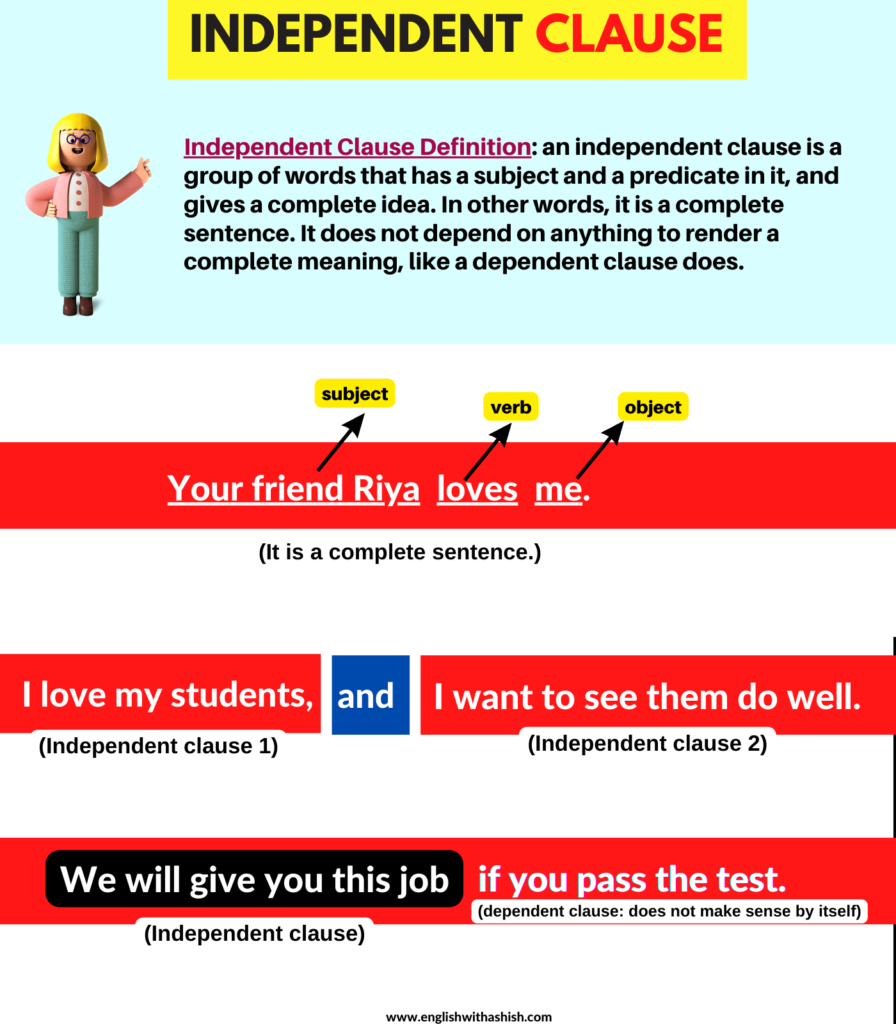
This lesson helps us understand everything about an independent clause in English.

A clause is a group of words that has at least one subject and a predicate. It can be independent (one that renders a complete meaning on its own) or dependent (one that depends on an independent clause as it is incomplete alone).
The first clause is an independent clause as it gives a complete idea on its own, and the second one is a dependent clause. It does not give a complete idea.
He came to see me though he was ill .
Independent Clause Definition : an independent clause is a group of words that has a subject and a predicate in it and gives a complete idea. In other words, it is a complete sentence. It does not depend on anything to render a complete meaning as a dependent clause does.
Your friend Riya loves me.
This is an example of an independent clause. It has a subject and a predicate and gives complete meaning on its own.
A compound sentence is a combination of two independent clauses added with a coordinating conjunction. Here are the 7 coordinating conjunctions in English: for, and, nor, but, or, yet, and so (FANBOYS).
I love my students, and I want to see the do well in life.
Independent clause 1 : I love my students
Independent clause 2: I want to see the do well in life
Coordinating conjunction : and
Notice both clauses are complete and give a proper meaning separately.
More examples:
A dependent clause is contrary to an independent clause, as the name suggests. It has a subject and a predicate but can’t stand alone to render a complete idea; it is incomplete without the help of an independent clause.
NOTE : a dependent clause starts with a subordinating conjunction, but an independent clause does not.
Examples :
Notice that all these sentences make sense alone as they are independent clauses, but dependent clauses don’t do that.
Examples :
Notice these don’t make complete sense as they seem incomplete. In order to make sense of them, we have to merge them with independent clauses.
Notice that the independent clauses give complete meanings on their own and the dependent clauses work as an adverb for the independent clauses. They either work as adverbs or adjectives here. When dependent clauses are used in a sentence, they function as nouns, adjectives, or adverbs.
A complex sentence is a combination of one or more dependent clauses and one independent clause. Let’s study some of them.
Examples :
The clause underlined in these examples is the independent clause, and the other part is the dependent clause.
When a noun is replaced with a noun clause in a sentence, it makes the sentence complex.
You are who you think you are .
Here, in this example, the sentence has a subject (you), a linking verb (are), and a subject complement (who you think you are). Notice that the subject complement is a noun clause and is used in place of a noun. If we used a simple noun here, the sentence would be simple, and there would be only one clause (independent clause) in it. For example – You are a visionary.
Since the subject complement is a dependent clause (noun clause), it makes the sentence complex where the independent clause has a dependent clause in it.
‘You are’ is not a complete clause/sentence. So, the complement is needed to make it complete. Adding a complement to it makes it a complete sentence (independent clause). But since the complement itself is a dependent clause, and this is already an independent clause, it makes it a complex sentence: a combination of a dependent clause and an independent clause.
More examples:
The dependent clauses (bold) are a part of the sentences (independent clauses). Removing them from the sentences would make the sentence incomplete as they are a vital part of them.
For a better understanding, try taking them out of the sentences and see if the sentences still make complete sense.
Notice that when we remove the dependent clauses from these independent clauses, the sentences stop giving the same meaning or making sense. It also depends on what a dependent clause does in a sentence. These examples don’t infer that removing a dependent clause from a sentence will result in making the sentence incomplete or ungrammatical.
I went to bed when you were having dinner .
The dependent clause, in this example, is a part of this sentence, working as an adverb. Removing it from the sentence would not make it incomplete or ungrammatical. Here is the result: ‘I went to bed’. Does the sentence not make complete sense after removing the dependent clause from it? It does, right? So, don’t come to the conclusion that removing a dependent clause from an independent clause or sentence will make it incomplete.
The position of an independent clause depends on the type of sentence it is. Let’s understand this with the help of a table showing it.
Get your Ebook Copy now with 30% Discount and Master All tenses.